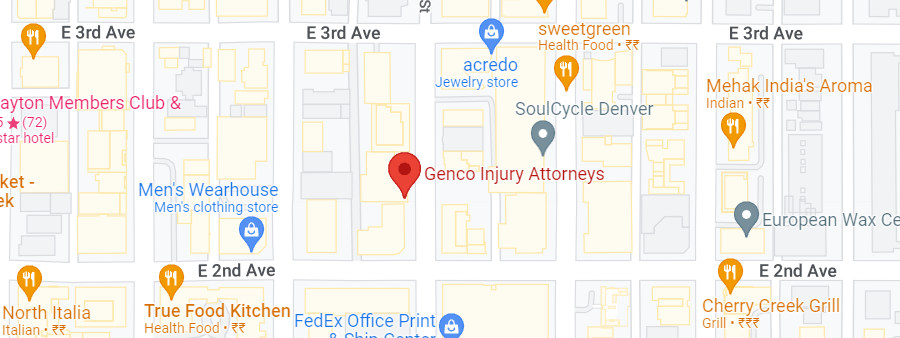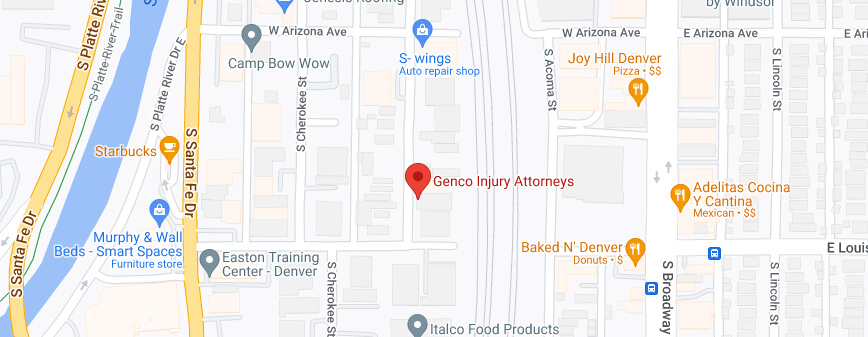Denver, CO, Emergency Vehicle Accidents Lawyers Seeking Justice for Crash Victims
Drivers of emergency vehicles have undergone extensive training to facilitate their ability to safely and rapidly pass through traffic when necessary in times of emergency. When the sirens are on, and they are on a call, the operators can often weave their way through the streets with astonishing speed and skill. Because of their unique responsibilities, they are often given broad leeway regarding traffic rules. However, they still have a duty to operate their vehicles within a certain level of safety so as not to endanger the life and well-being of others on the road.
If you are injured by a car accident with an emergency vehicle, it can feel horribly ironic and frustrating because they are the very people who are supposed to help and protect you in dangerous situations. Many people have qualms about filing a personal injury claim against an emergency vehicle operator, but these operators should be held to the same standard as other drivers on the road. If they acted as a negligent driver and caused an auto accident with serious injuries, you deserve to seek financial compensation for your medical expenses, the emotional trauma you suffered, and any future medical bills you may have. Because it can be challenging to file claims relating to emergency vehicle collisions, and you only have a short window of time to bring your case, it is imperative to contact a personal injury law firm as soon as possible. Call Genco Injury Attorneys today at 303-500-1376 for a free consultation.
What Causes Accidents With Emergency Vehicles?
Emergency vehicles include fire trucks, police cars, ambulances, and any other conveyances which need to get to emergencies in a timely manner to provide aid to citizens. While operators of emergency vehicles are highly trained, there are sometimes situations where an operator can drive in an unsafe or negligent manner, leading to car accidents. Some common causes for emergency vehicle collisions include:
- Failing to properly utilize lights, sirens, and horns to alert motorists to their presence
- Running through stop lights or intersections without ensuring the area is clear
- Following too closely behind other vehicles possibly leads to rear-end collisions
- Taking corners or turns at unnecessary or uncontrollable speeds
- Weaving through traffic in an unsafe manner
- Attempting to use lane gaps that are too small for the vehicle
How Does Government Immunity Apply to an Emergency Vehicle Operator?
One of the major challenges of seeking compensation for an emergency vehicle accident is the fact that most operators of those vehicles are granted government immunity when it comes to performing their jobs. Under the Colorado Governmental Immunity Act (CGIA), many government entities are provided protection from legal claims. This means that if the accident happened while the vehicle was en route to an emergency with lights and sirens on and the driver took necessary care to drive safely, they would likely be immune from lawsuits.
So is there any recourse for a victim? Yes, if the operator of the emergency vehicle did not exercise sufficient care in their driving or acted negligently, which led to severe injuries or fatalities, the victim or their families may pursue compensation from the operator’s employer. However, there are strict rules governing timely filing limits and how the claim must be conducted, so hiring a law firm familiar with the CGIA that will properly manage your case is critical. You must act quickly, though, because the statute of limitations on cases involving a public entity or its employees is six months from the date of your accident. A reputable lawyer can offer you a free consultation to determine the viability of your claim and discuss your legal options.
What Damages Can Be Sought in an Emergency Vehicle Accident Case?
If you have a viable personal injury lawsuit, there are two main types of damages your attorney may secure for you. The first is actual compensatory damages. These compensate you for actual economic losses that occurred as a result of your injury. Examples of this kind of compensation include:
- Expenses for ER visits and surgeries
- Lost wages
- Health insurance copays
- Medical equipment
- Physical therapy and rehabilitation
- Transportation costs to and from doctor visits
General compensatory damages are non-monetary losses you suffered from the accident. These losses are a little more challenging to place a dollar amount on. In general, the more severe your injuries are and the longer they have affected or will continue to affect you, the greater your compensation will be. Common examples of general compensatory damages are:
- Emotional distress
- Future medical expenses for long-term injuries
- Loss of enjoyment of life
- Loss of future earning potential
- Mental anguish
- Pain and suffering
In the case of fatal crashes, the surviving family members may be entitled to wrongful death compensation and damages for loss of companionship and lost income.
Why Is It Vital to Hire a Skilled Lawyer for Your Claim?
Bringing a case against a government entity for the actions of a negligent driver of an emergency vehicle can be complex and involved. Not to mention that because of the respect many people have for police officers, firefighters, and paramedics, it can feel highly uncomfortable to consider bringing legal action against them. But if you have been hurt in an automobile accident with a fire truck, ambulance, or police car, you deserve to be made whole again after the losses you’ve suffered. The individuals operating these vehicles are worthy of respect, but they should also be held liable for their actions. Especially if they have caused harm to the public, they are meant to protect.
If you or a loved one have been harmed in a collision with a Colorado emergency vehicle, contact Genco Injury Attorneys for a free case evaluation: 303-500-1376. We will provide you with a no-obligation consultation where we can discuss your legal rights and options for seeking fair compensation.







